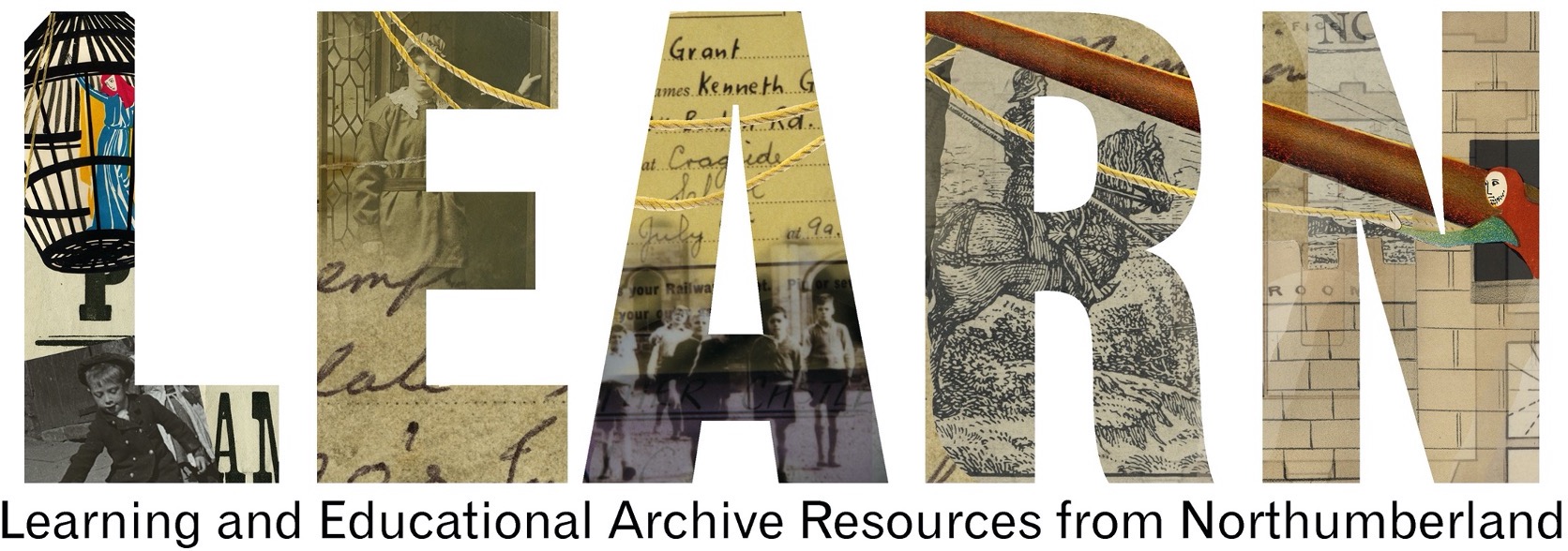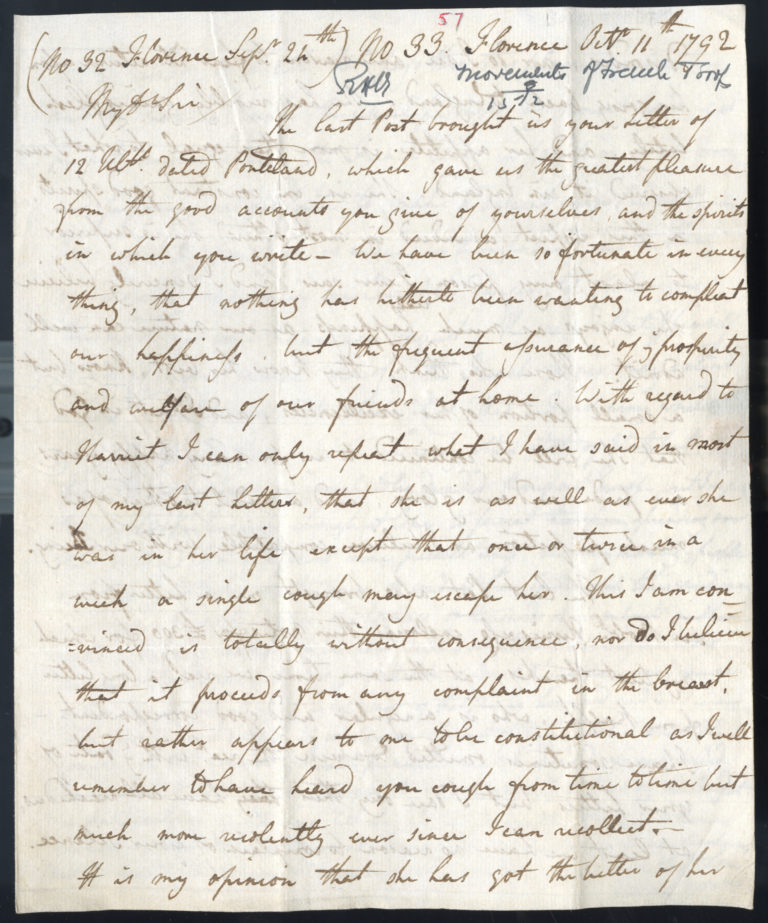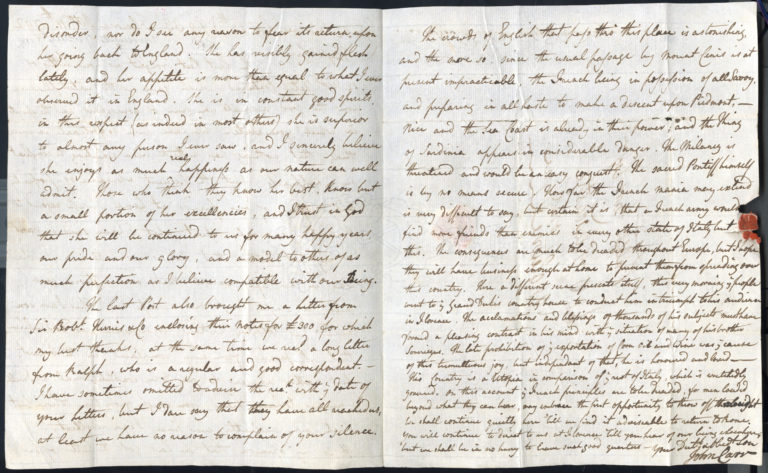Letter From John Carr to Ralph Carr About Invasions Made by The French Army, 1792
Reference: ZCE F/1/1/1/125
Suggested age groups: KS2, KS3, KS4, Lifelong Learners
Subject areas: History, Literacy, Geography
CONTEXT
The French Revolutionary Wars were a series of conflicts across Europe lasting from 1792 to 1801, in which France fought against Britain, Austria, Prussia, Russia and several other European monarchies. The conflict is divided into two periods: the War of the First Coalition (1792-1797) and the War of the Second Coalition (1798-1802).
The conflicts were a direct result of the French Revolution (1789-1799) which stemmed from discontent towards absolute monarchy, dissatisfaction with the Estate System and the bourgeoise, poor harvests, inflated costs, decreased wages, and riots. European nations were shocked to learn of events in France and were fearful of the spread of revolution across the continent.
This letter was written by John Carr, from Florence, Italy, to his father Ralph Carr on 11th October 1792.
In the third paragraph John writes about the political situation in Europe which prevented John and Harriet’s planned return home earlier in 1792. John comments that ‘The crowds of English that pass thro’ this place is astonishing, and the more so, since the usual passage by Mount Cenis is at present impracticable, the French being in possession of all Savoy, and preparing in all haste to make a descent upon Piedmont. Nice and the Sea Coast is already in their power, and the King of Sardinia appears in considerable danger’.
The large number of British tourists is likely to have been because, like John and Harriet, many had been unable to return home. Most tourists crossed the Alps to Italy rather than travelling by sea which was considered more dangerous. John refers to the Mount Cenis Pass, the popular route across the Alps. The Pass was not suitable for carriages which were dismantled at the foot of the Pass. Carriages were transported across the Pass by mules and visitors were carried across in sedan chairs by porters. Mount Cenis has become impassable because the French has taken possession of Savoy. Savoy, in the Western Alps, now part of France, was a separate state in the 18th century and was occupied by the French Revolutionary forces between 1792 and 1815.
Until 1861 when the country was unified, Italy comprised a number of states and republics, two of which were Sardinia and Milan. Several were papal states that were under sovereign rule of the Pope. John suggests that there was widespread support for the French Revolutionary forces, ‘How far the French mania may extend is very difficult to say, but certain it is, that a French army would find more friends than enemies in every other state of Italy but this. The consequences are much to be dreaded throughout Europe …’. John’s letter describes the impact of the French Revolution in mainland Europe and support for republican government beyond France.
(No 32 Florence Sep[tembe]r 24th) No 33 Florence Oct[obe]r 11th 1792
My D[ea]r Sir
The last Post brought us your Letter of 12 Ult° dated Ponteland, which gave us the greatest pleasure from the good accounts you give of yourselves, and the spirits in which you write. We have been so fortunate in every thing, that nothing has hitherto been wanting to compleat our happiness, but the frequent assurance of the prosperity and welfare of our friends at home. With regard to Harriet I can only repeat what I have said in most of my last Letters, that she is as well as ever she was in her life except that once or twice in a week a single cough may escape her. This I am convinced is totally without consequence, nor do I believe that it proceeds from any complaint in the breast, but rather appears to be constitutional as I well remember to have heard you cough from time to time but much more violently ever since I can recollect. It is my opinion that she has got the better of her disorder, nor do I see any reason to fear its return upon her going back to England. She has visibly gained flesh lately, and her appetite is more than equal to what I ever observed it in England. She is in constant good spirits, in this respect, (as indeed in most others) she is superior to almost any person I ever saw, and I sincerely believe she enjoys as much real happiness as our nature can well admit. Those who think they know her best, know but a small portion of her excellencies, and I trust in God that she will be continued to us for many happy years, our pride and our glory, and a model to others of as much perfection as I believe compatible with our Being.
The last Post also brought me a Letter from Sir Rob[er]t Herries & Co enclosing their notes for £300 for which my best thanks, at the same time we rec[eive]d a long letter from Ralph, who is a regular and good correspondent. I have sometimes omitted to advise the rec[eip]t with the date of your Letters, but I dare say that they have all reached us, at least we have no reason to complain of your silence.
The crowds of English that pass thro’ this place is astonishing, and the more so, since the usual passage by Mount Cenis is at present impracticable, the French being in possession of all Savoy, and preparing in all haste to make a descent upon Piedmont. Nice and the Sea Coast is already in their power, and the King of Sardinia appears in considerable danger. The Milanesy(sic) is threatened and would be an easy conquest. The sacred Pontiff himself is by no means secure. How far the French mania may extend is very difficult to say, but certain it is, that a French army would find more friends than enemies in every other state of Italy but this. The consequences are much to be dreaded throughout Europe, but I hope they will have business enough at home to prevent them from spreading over this country. Here a different scene presents itself, this very morning the people went to the Grand Duke’s country house to conduct him in triumph to his audience in Florence. The acclamations and blessings of thousands of his subjects must have formed a pleasing contrast in his mind with the situation of many of his brother Sovereigns. The late prohibition of the exportation of Corn Oil and Wine was the cause of this tumultuous joy, but independent of that, he is honoured and loved. This Country is a Utopia in comparison of the rest of Italy, which is wretchedly governed.
On this account the French principles are to be dreaded, for men loaded beyond what they can bear, may embrace the first opportunity to throw off the Weight[.] We shall continue quietly here ’till we find it adviseable (sic) to return to Rome. You will continue to direct to us at Florence ’till you hear of our being elsewhere, but we shall be in no hurry to leave such good quarters. Your Dut[ifu]l & Obed[ien]t Son John Carr
ACTIVITIES
ACTIVITY 1
Background
In the third paragraph John writes about the political situation in Europe which prevented John and Harriet’s planned return home earlier in 1792. John comments that ‘The crowds of English that pass thro’ this place is astonishing, and the more so, since the usual passage by Mount Cenis is at present impracticable, the French being in possession of all Savoy, and preparing in all haste to make a descent upon Piedmont. Nice and the Sea Coast is already in their power, and the King of Sardinia appears in considerable danger’.
SEE
See: What has delayed John and Harriet’s journey home?
See: Which travel routes are mentioned in the letter?
See: Which locations have French Revolutionary forces occupied?
See: How were carriages transported across the Mount Cenis Pass?
See: How were people transported across the Mount Cenis Pass?
THINK
Think: What is a sedan chair?
Think: Where is the Mount Cenis Pass?
Think: Where are the Alps?
Think: How long would it have taken to travel from Italy to England in 1792?
Think: Why was it considered dangerous to travel by sea?
Think: What would have been the potential dangers of travelling through the Alps?
DO
Do: Before reading the context or translation, study the letter for 10 seconds. What is your first impression?
Do: Before reading the context or translation, study the letter for 30 seconds. Are there any words or phrases that stand out to you?
Do: Before reading the context or translation, study the letter for 60 seconds. Can you work out what the main topics, themes or messages are?
Do: Create a military map showing where France occupies based on John’s letter.
Do: Add to the map to show the usual Grand Tour route from Italy to England.
Do: Draw a diagram of a sedan chair.
Do: Choose three locations from your map where Grand Tourists would have passed through. Research each location. What would tourists have seen and done while there? Was the location affected by the war?
Do: Imagine you are a Grand Tourist. Write a travel journal entry for each of the locations you have researched.
Do: Plan a safe route to get John and Harriet back home to England, taking into consideration how they would have travelled, the length of time it would have taken, and military occupation.
Resources
ACTIVITY 2
Background
Until 1861 when the country was unified, Italy comprised a number of states and republics, two of which were Sardinia and Milan. Several were papal states that were under sovereign rule of the Pope. John suggests that there was widespread support for the French Revolutionary forces, ‘How far the French mania may extend is very difficult to say, but certain it is, that a French army would find more friends than enemies in every other state of Italy but this. The consequences are much to be dreaded throughout Europe …’. John’s letter describes the impact of the French Revolution in mainland Europe and support for republican government beyond France.
SEE
See: When was the unification of Italy?
See: What did Italy comprise of before unification?
See: Who governed the Italian states and republics before unification?
THINK
Think: How did the French Revolution impact the governance of other European states?
Think: Did the French Revolution lead to more revolutions?
Think: How does John’s letter suggest that there is support for the French Revolutionary forces in Italy?
Think: What impression does the letter give about John’s attitude towards the French Revolutionary forces?
Think: Which European states supported the French Revolution?
Think: Which European states were against the French Revolution?
Think: Why did some European states support the French Revolution?
Think: Why did some European states oppose the French Revolution?
Think: Is there a theme that connects those who supported and those who opposed the French Revolution?
DO
Do: Create a map showing the European states who supported the French Revolution.
Do: Add to your map to show the European states who opposed the French Revolution.
Do: In groups, debate whether you would have supported or opposed the French Revolution. Use evidence to support your opinion.
Do: Create a diagram showing the different Italian states and how they were governed during the 1790s.
Do: Watch the History Matters video on Italian unification.
Do: Discuss how the Italian unification changed the way that the country was governed.
Do: Discuss the causes of the unification of Italy.
Do: Discuss the consequences of the unification of Italy.
Resources
https://www.oldmapsonline.org/
https://www.britannica.com/place/Italy/Revolution-restoration-and-unification
http://omeka.wellesley.edu/piranesi-rome/exhibits/show/18th-century-urban-life/general_information
https://www.britannica.com/place/Italy/Unification
https://www.youtube.com/watch?v=kjFscoiE8eI&ab_channel=HistoryMatters
https://history.state.gov/countries/issues/italian-unification
OTHER ONLINE RESOURCES
French Revolutionary Wars
Britannica page on the French Revolutionary Wars: https://www.britannica.com/event/French-revolutionary-wars
Military Maps page on the French Revolutionary Wars: https://militarymaps.rct.uk/french-revolutionary-wars-1792-1802
Oxford timeline of the French Revolutionary Wars: https://www.oxfordreference.com/view/10.1093/acref/9780191737817.timeline.0001
National Archives resources on the French Revolution: https://www.nationalarchives.gov.uk/education/resources/french-revolution/
BBC page on the French Revolution with video by Andrew Marr: https://www.bbc.co.uk/teach/class-clips-video/history-ks3-gcse-the-french-revolution/zb9d2sg
Italian Governance and the Unification of Italy
Britannica page on the unification of Italy: https://www.britannica.com/place/Italy/Unification
History Matters video on the unification of Italy (10 mins): https://www.youtube.com/watch?v=kjFscoiE8eI&ab_channel=HistoryMatters
Britannica page on Italian governance: https://www.britannica.com/place/Italy/Revolution-restoration-and-unification
Wellesley page on Italian governance and states: http://omeka.wellesley.edu/piranesi-rome/exhibits/show/18th-century-urban-life/general_information



